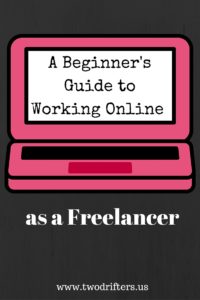This post may contain affiliate links. Read our disclosure page for full details.
These days, it seems like nearly everyone is living the dream.
Quit your job! Ditch the grind! Travel for free!
Quick slogans and splashy photos advertise the ideal lifestyle: lounging on a beach while apparently raking in the dough. But a lot of those catchphrases and idyllic images aren’t being honest. Sure, there’s probably someone out there who has built a system of passive income and travels the world for a living. There definitely are people who have landed those jobs…but likely only a handful. A lot of travel bloggers are guilty of making it look a bit too easy. All you have to do is quit your 9-5 and apparently you can write a basic blog and make bank. Oh, how I wish it were that simple!
Truth is, most travel bloggers are doing scads of other work behind the scenes. While years of work and strategy could potentially enable you to make a full-time income off of your blog alone, that will take some time. Meanwhile, join the rest of us—freelancing, writing, consulting, designing, you name it.
What it boils down to is: You can quit your (traditional) job and travel the world, if you so desire. But if that is what you want, you are going to have to work for it. That’s one of the best ways to afford to travel the world as a couple!
I’ll tell you how I did it. There are many, many paths to working online, and tons of people are figuring out that you can indeed make a living via the Internet. What a time to be alive!
Perhaps you are in a “normal” career currently, but yearning to try something unconventional. Maybe you are a brave soul who thinks they may want to try their hand at freelancing but has no idea where to begin. This guide is for you.
How it All Started
In 2013, Nathan and I lived in the northeastern US. We were in the midst of a frugal existence, trying to save up money to travel to Australia in the next several months. I sought employment in my usual trade: food service. In the states, because of tips, waiting tables can be great money. I love having that skill and experience under my belt because I know I can work anywhere and earn a solid living. But serving is also hard (and often thankless) work. At that time, too, I worked at a chain restaurant, which I quickly learned meant less stellar tips and a wider range of customers–many who don’t understand proper tipping etiquette (or even basic manners!). I was really keen to get out of the business.
I tried my hand working at a calmer place–a gift shop known for its flashy, yet complicated baskets of wine and cheese. But with a part time schedule and a measly $10/hour, it was barely enough to scrape by. And I had a snappy, overworked boss who seemed to think I couldn’t even handle running a cash register. Ah, that was a pleasant month.
I also applied at more career-oriented places. Colleges, law offices, etc. I thought they’d be happy to hire someone like me with a shiny Master’s Degree in hand. Nope. I’m sad to say the job market is scarce and depressing, even for the well-educated.
Eureka! A Lucky Break
With a run of crappy jobs and nothing that really made use of my skills (or interests) on the horizon, I honestly sort of fell into freelancing. I needed money and I needed to figure out a way to make it. I did a lot of Google searches (how to make money online, work from home, etc.) and found a few basic freelancing sites. The ones I stumbled across were Elance, Upwork (formerly oDesk), and Guru. They seemed easy to navigate and promised loads of job opportunities for talented individuals. I was excited to get started and signed up for all three.
I immediately found Upwork to be the most straightforward. I built a profile and advertised my services. I knew with my English background I could be well-suited to writing, editing, and proofreading. Having been writing Two Drifters for some time, I also included the category of travel writing. I wrote a bio and made myself sound as friendly, capable, and least desperate as possible. Upwork asked me to set an hourly rate for myself. $12/hour? I thought. At least it was more than I was making in gift basket hell.
I didn’t just register in the writing and editing categories, however. I applied to jobs in transcription, voice over, and data entry, among the many other options on Upwork. It wasn’t terribly hard to get my first few jobs. My rates were reasonable enough and I took the time to compose a nice cover letter with each application (a key point).
I was awarded a task as a transcriptionist. Boy, I’ll never do that again! You need special software to really do that successfully. It was a painful 10+ hours as I stumbled through a 1 hour medical interview. I also made a series of videos explaining how to use a new smartphone app for preschool teachers. That was an interesting experience, to say the least, requiring the use of both mine and Nathan’s iPhones and a lot of retakes. Oy.
But I began to get jobs writing! Writing about travel and often doing “copywriting” which was a new thing for me. Copywriting is essentially writing for business, marketing, or sales purposes. For me, this has grown to include website content, blogs for businesses, marketing emails, landing pages, and product descriptions, but can include other tasks as well. Gradually over time, I increased my rates little by little and began to look outside of the Upwork platform for work.

Figuring Out What You’ll Offer
So that’s how I started out working online as a freelancer, but there are many different paths you could take. The first thing to consider is what you’ll offer customers (and/or the world). For a business to succeed, it generally needs to fill a void. If you’re really creative and enterprising, you could perhaps invent an entire online business. Or if you’re crafty, you could create things and sell them on Etsy. Those arenas are not my forte, however. While I’m fairly business-minded, starting an original business from scratch takes a special entrepreneurial spirit. And crafty? Not a chance.
For me, choosing a market that was already quite “tapped”, such as copywriting, seemed like the right choice. There’s plenty of room for more writers to thrive here. In the beginning, as I mentioned, I didn’t go at it as purposefully as I would now. Thus, I sort of stumbled into copywriting, but in retrospect, it makes total sense given my skills and writing style.
Because my experience is in blogging and copywriting, I can’t speak to other forms of freelancing or online work, but I think a lot of the same principles would work for a range of fields. If you’re looking to get onboard the digital nomad sort of lifestyle, start brainstorming what it is you have got to work with.
Let’s Pause to Define Some Terms
When you’re first starting out in freelancing or working online, its easy to feel pretty lost when it comes to terminology. So, I thought I’d throw out my definitions of various jobs or tasks, just in case it helps someone on their journey.
Copywriting – typically writing for the purpose of sales or marketing. This could be direct response copywriting (sales letters), scripts for email marketing, content for websites, product descriptions, advertisement copy, and more. I ghost write blogs for several businesses. While these blogs are informative and useful to reader of their blog (potential customers), I still consider it copywriting as the purpose is to engage and attract customers. This type of writing makes a business or organization look good.
SEO Copywriting – Another purpose of something like a business blog is SEO or Search Engine Optimization. This type of copywriting is focused on using certain techniques and keywords to optimize your content for Google and other search engines. In essence, it’s writing copy or content that helps a website rank higher when people search for certain terms. For SEO purposes, Two Drifters might incorporate keywords for travel, couples travel blog, and much more. This helps us get found online. SEO is not overly complicated and you can learn all about it online.
Content writing – often an interchangeable term with copywriting. When I think of content writing, I picture an assignment of blog posts or articles for a website, but that maybe aren’t necessarily for a sales purpose. Perhaps more in-depth pieces, personal writing, or general writing.
Proofreading – reviewing a piece of text or document to check for errors in spelling, grammar, punctuation, and word usage. Proofreaders typically don’t alter the content of a document greatly, but generally make minor changes which polish the piece. This type of work requires excellent attention to detail and a lot of patience.
Editing – editing sometimes incorporates proofreading. Many clients will seek out a combination proofreader/editor for documents. An editor’s primary job, however, is to evaluate the piece for clarity, fluidity, word choice, etc. The editor takes a piece of writing and molds it to make it better. Editing tasks vary widely, but may include anything from essays, web content, and emails to entire novels and major academic papers. If working with academic papers, it is helpful for editors and proofreaders to be proficient in different reference styles such as MLA or APA.
Freelance Writer – one who writes independently. Again, this term is somewhat interchangeable. In my mind a freelance writer does a whole host of things, but perhaps seeks to contribute to magazines and online publications. Somewhat similar to a journalist, but writing pieces that are less news-based. A freelance writer will often receive a byline, which means they get their name and perhaps a bio along with their published piece. They get credit for their writing! (This is a major difference from copywriters who are nearly always “behind the scenes.”
Social Media Marketing – sometimes called social media management, this type of work entails writing and publishing social media posts for a business, organization, or even an individual. As a social media manager, your aim is to make an organization shine, and to engage with its customers. You should be very familiar with Facebook, Twitter, LinkedIn, Google+, and other popular platforms. Graphic design and basic photo editing are probably also a plus. For the right candidate, this kind of work could be super fun. Social media managing doesn’t always have to be freelance work, however. You might be employed directly in such a role by a business or organization. The same is true of most of the other positions I’ve mentioned. For example, many advertising agencies work with “in-house copywriters”, which are direct employees of the agency.
Professional Blogger – this is probably the dream job for many. Pro bloggers are few and far between but they are out there. These writers are covering every imaginable niche. They make their money through ads on their sites, affiliate marketing (making a small commission by promoting others’ products), sponsored posts, partnerships, speaking engagements, and the sales of their own personal products such as ebooks, ecourses, or diet plans. This is a really tough gig and will take some serious dedication to make it possible. Instead of making money through their blogs alone, a huge number of bloggers out there use their blogs as platforms for their other writing. This is an effective way to generate an ongoing portfolio and to build an online presence .
I hope that explains some of the potential jobs you could do online. I admit, the terminology seems straightforward enough at first, but it can be confusing. Folks use these titles interchangeably, so it’s okay if you do, too. The guidelines I’ve laid out make sense to me, but others might define them slightly differently. And, it’s okay not to pigeonhole yourself. You don’t have to only pursue one field alone, but can pick from a variety of endeavors. There are different schools of thought on this though, and copywriters in particular may feel you’ll be more successful with one focus and one niche. I say, try a bit of everything!
It’s Ok to Start Small, Just Don’t Stay There
Once you’ve decided what you will pursue, the fun begins. If you’re considering writing or editing, go ahead and follow my lead and start on a site such as Elance or Upwork. But my caveat is: don’t stay there forever.
Why not?
Platforms like Upwork are ideal for the beginning freelancer. You see what kinds of tasks are available and get to know the way it all works. However, these sites are well known for advertising appallingly low-paying jobs. There are some diamonds in the rough (jobs that pay a decent rate) but you will have to search for them with gusto.
Once you’ve gotten some work under your belt and you’ve gotten a feel for things, you may want to start raising your rates. This is difficult with these freelance websites. It is even harder to land a job on there when you’re demanding a higher rate. Those who are willing to pay for the quality of your service are now going to be found elsewhere. It is at this point that you can take your next steps.
Websites, approaching clients, marketing
This is where you realize, “hey, I’m building my own business!” Because THAT’s what is needed to make real money. Freelancing, copywriting, web design. Whatever you are doing, you have to view it as a business. That’s a big part of turning your part-time, side venture into a full time career.
- Build a website
If you’re a business in this day and age, there’s no excuse not to have a website. And it is especially key as a freelancer. Your website is a way to showcase your services, experience, and work. I prefer publishing via WordPress and hosting, at least to start, with Siteground. You might have to find some tutorials online if the whole website thing is new to you, but these are fairly straightforward. (I built our entire Two Drifters website myself using these two tools. Kudos to me!) Through Siteground or another service you can register your domain name and host your domain. If you’re starting out as a freelancer, why not just grab a domain with your first and last name? Alternately, you can name your business something clever.
As you design your website, keep things simple and straightforward. No one wants a cluttered site. Put time and effort into sprucing up your site and really “sell” yourself. Make clients feel they just have to hire you!
- Approach Clients
Services like copywriting, social media, and web design are something that nearly every business will require at some point. So start right in your own neighborhood. Are you a regular at a local coffee shop? Consider approaching the management and offering to design a new website, write blog posts, assist with social media….whatever your business is. You might get a lot of “no’s” before you get that first “yes.” But with persistence, it will come. If your portfolio is lacking, you may opt to provide a sample for free, or work on a trial basis. Do what you need to do to get your foot in the door.
Once you’re hired, do great work. Your quality will speak for itself, and your reputation will grow. Plus, now that you’ve landed your first gig, you can start beefing up that online portfolio on your website.
- Market Yourself
As uncomfortable as it may be at first, to become a successful, money-making freelancer, you need to market yourself. You have to talk yourself up. Your website is a great place to shine, but don’t forget to utilize other resources. LinkedIn, social media. These are an easy way to put your name out there and connect with others, both those who may want to hire you and those you can learn from. Don’t be afraid of networking, both in person and online. The harder you work to get noticed, the more projects and clients you’ll get. It does pay off.
My Next Steps
Having a copywriting website, approaching potential clients, and marketing myself via LinkedIn and other groups is how I took the leap and moved from Upwork and Elance to working directly for clients. Taking these steps is how I was able to increase my rates over time and finally make a decent living. And hopefully the rates will continue to climb as I get more and more experienced. I had to put myself out there a great deal. But when you do solid work, clients recommend you to others. So many of my projects have come to me via this approach. But believe me, it is an ongoing process and I’m still very much marketing myself all the time. Despite the many perks of working online, it’s important to remember that this is still a job, and it’s a mighty hard one at that. In a future blog post, I’ll address some of the ins and outs of freelancing, including time management, handling taxes (for US citizens), invoicing, organizing, and getting paid.
What If I Have No Skills?
First of all, if you believe you have no skills, you need to grab a self-help book immediately on building confidence. You cannot be successful as a freelancer without a healthy dose of self-esteem. You need to believe in yourself more than anything.
Second, you certainly do not have NO SKILLS. Perhaps you don’t have natural talents in writing, web design, or social media. The good news is, many of these things can be learned. Like anything else, with dedication and persistence, you can improve at these skills in an incredible way and then put them to work for you. Best of all, the Internet is your virtual oyster. Everything you need to know to succeed online can probably be found…online. There is a wealth of information out there: courses, blogs, ebooks, you name it. Get to studying and develop the skills you really want.
Links and Resources
To help you get started on the road to working online, I’ve compiled a list of what I consider especially useful resources. You are very welcome!
The Six Figure Freelancer Community – best Facebook group out there more making money as a freelancer
Getting started with freelance writing? Lizzie of Wanderful World will help you so. freaking. much.
Here’s a list on Freshbooks of 17 great sites to find freelance jobs. Side note: Freshbooks is an excellent online accounting and invoice tool for freelancers.
Some suggestions from writer Linda Formichelli on where to pitch freelance writing ideas.
An incredible free ebook that helps you price your services. Get paid what you’re worth!
A copywriter’s manifesto by Ed Estlow via Steve Roller. Fantastic business tips for the copywriter and tested ways to hone your skills.
The entirety of the Copyblogger website. So much good stuff.
Struggling with productivity? Here’s a nice concise path to overcoming procrastination.
And, if you want to take the plunge and become a professional travel blogger, here’s a swell comprehensive guide.
Got further questions? Feel free to ask them in the comments!
x Amy


Amy Hartle is the author of Do You Love Me? How To Stop Seeking Reassurance in Relationships, a book on reassurance seeking and relationship anxiety. Both her book and this blog are born of personal experience; Amy shares expert relationship advice from the lessons learned during her own 10+ years with her husband, as well as couples travel tips and romantic getaway recommendations, all gleaned while traveling the world together.



